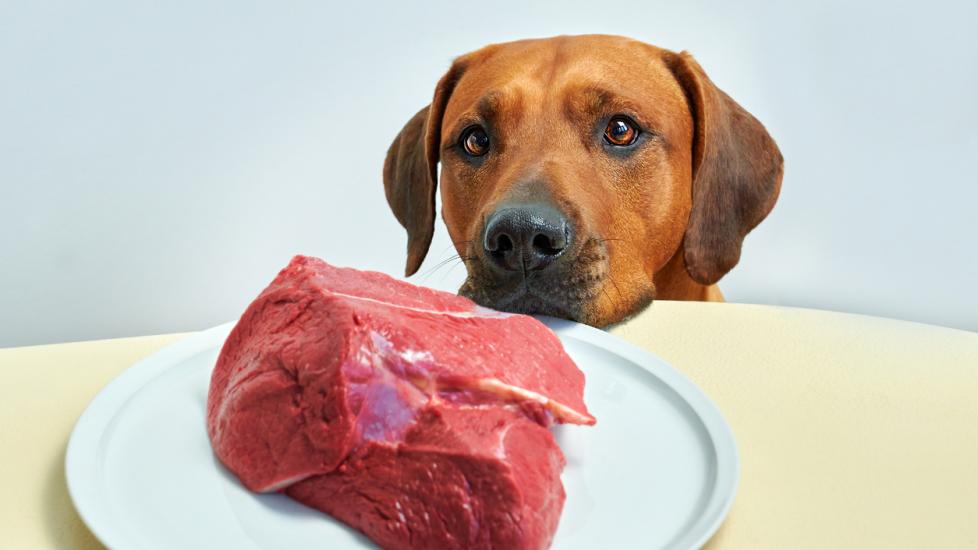Can Dogs Eat Raw Meat?
NOTE: Always check with your veterinarian first before giving your dog any new foods, especially “people foods.” What might be OK for one dog might not be good for your dog, depending on multiple factors, such as their age, health history, health conditions, and diet. Dogs on prescription diets should not be fed any food or treats outside the diet.
If you’ve heard about raw dog food, you may be wondering if it’s safe to feed your dog uncooked meat. Fans of raw food diets for dogs claim that feeding your dog raw meat offers health benefits that processed dog food doesn’t have. The idea is that raw meat is closer to what their canine ancestors would have eaten in the wild, and therefore a better option for digestion and nutrient absorption.
But it's not that simple. Dogs today are domestic pets who live longer lives in the comfort of home, unlike the wild dogs and wolves who roamed the earth before Fido graduated to the sofa. While their bodies do still have the ability to digest raw animal protein, it's not a good idea to feed them raw meat. That's because raw meat and fish can cause serious health issues like food poisoning, which can even make you and other members of your household sick—not just your dog.
Keep reading to learn more about the risks of feeding your dog raw meat, and how to ensure they get the nutrients they need from safe sources instead.
Is Raw Meat Good for Dogs?
Dogs are natural carnivores that can digest raw meat, but that doesn't necessarily mean raw meat is good for them. Uncooked meat can harbor harmful bacteria such as salmonella, E. coli, and Listeria, which cause foodborne illnesses that can make your dog very sick.
The Centers for Disease Control and Prevention and animal nutrition experts do not recommend feeding a raw food diet for dogs. Instead, choose a regular balanced dog food diet that contains all the nutrients needed to keep your pet healthy.
That said, if your dog eats a small amount of raw meat that falls on the floor while you're cooking, they'll likely be fine. But even a small amount of E. coli or Salmonella can be harmful, so monitor your pup for signs of illness and call the vet if you have concerns.
What to Know About Raw Food Diets for Dogs
While occasionally eating fallen bits of raw meat might be fine for your dog, a raw food diet is different. There are several health risks associated with raw food diets. In addition to infections from bacteria like salmonella, E. coli, and Listeria, dogs on a raw food diet may not receive all the nutrients they need from other sources.
In spite of the risks, some pet parents still opt to switch their dog to a raw food diet. Though there are some possible nutritional benefits that your dog could gain from eating raw meat, the health risks of uncooked meat outweigh the benefits. The U.S. Food and Drug Administration advises against feeding your dog raw meat, along with the CDC and the American Veterinary Medical Association.
Switching to a raw food diet should only be done after careful consideration of the potential health risks. Before you decide to feed your dog a raw food diet, talk to your vet about whether it’s a good idea. Your vet can point you to the best food based on your pup’s lifestyle and health history.
Can Dogs Die From Eating Raw Meat?
While it's rare for dogs to die from eating raw meat, it's important to take the potential health risks seriously. In addition to the risk of bacterial infections, raw meat can also contain bones that can cause choking or intestinal blockages.
If you're concerned about your dog's health or if they show any signs of illness after consuming raw meat, call your vet.
How to Prepare Meat for Dogs
If you want to add a fresh, healthy protein source to your dog's dish, it's best to opt for cooked meat instead of raw. This will help minimize the risk of bacterial infections and other health issues.
Make Sure It’s Cooked
Anytime you prepare meat for your dog, remove any bones or skin that could be a choking hazard. Plain, cooked chicken, turkey, or beef are good options. You'll want to boil or bake it (don't fry!) and remove any excess fat, especially if your dog is overweight or has a condition affecting the pancreas, such as diabetes or pancreatitis.
Avoid Harmful Additives
Avoid any seasonings or spices that can make your dog sick, such as garlic or onion powder, since both are toxic to dogs.
Cut It Up
Cut meat into bite-sized pieces or opt for ground options that are easier for your pooch to chew and digest.
Talk to Your Vet
As with any new food, check with your vet before making any changes to your dog’s diet. Anytime you’re adding new ingredients to your dog’s bowl (cooked or uncooked), it’s a good idea to talk to your vet to determine what the best balanced diet looks like for your pet's long-term health.
Featured Image: iStock/Zontica
